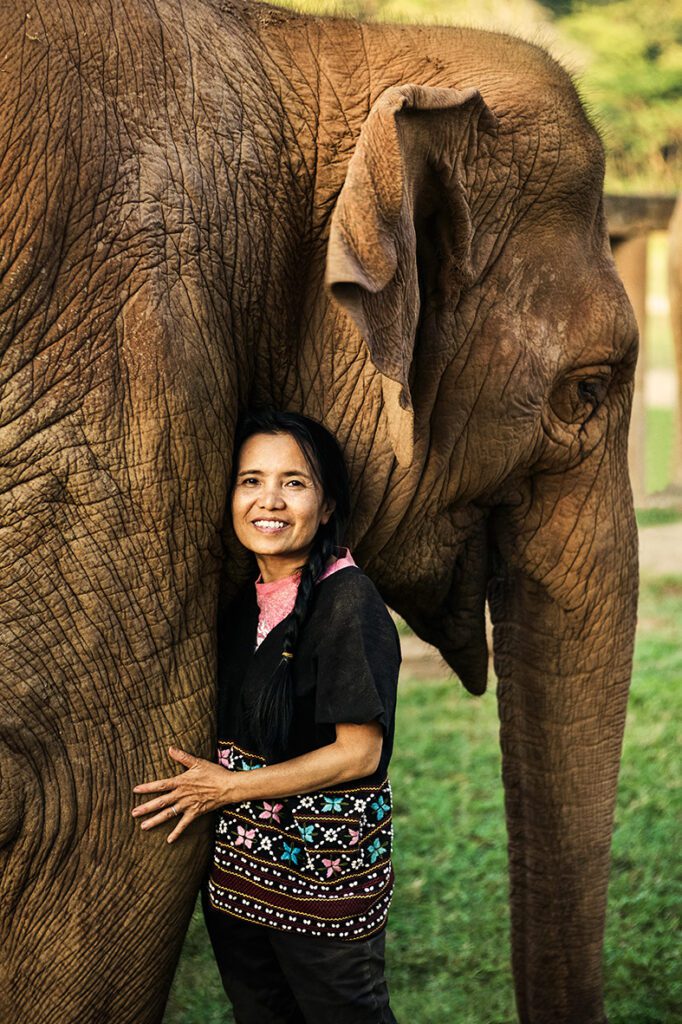Picture courtesy Save Elephant Foundation
SUSTAINABILITY IS one of the major elements in tourism and Thailand is at the forefront of destinations working hard to preserve and protect our planet’s resources.
As part of its Visit Thailand Year 2023: Amazing New Chapters campaign, the Tourism Authority of Thailand (TAT) is placing emphasis on the promotion and development of high value, sustainable and experience-based tourism.
This year TAT will again be supporting the Spotlight Koh Tao event, which comprises workshops and exhibitions that highlight the island’s dedication to conservation and land and sea revitalisation.
Staged from April 7 to 9, the event will give attendees the chance to participate in coral reef rehabilitation, reef watch monitoring, underwater and beach clean ups, and fish aggregation with local fisherman.
On land, guests can take part in watershed forest rehabilitation, tie-dying and sea glass jewellery workshops, and a zero-waste Thai cuisine class.
TAT’s drive towards more sustainable and responsible tourism was also reflected at World Travel Mart 2022 held in London last year.
The Thailand stand featured the concept of Meaningful Travel: Responsible and Sustainable Tourism’, placing emphasis on the country’s strengths in biological diversity and cultural richness. The interior design and decoration was based on a nature’ concept.
In addition, the 38 sellers from Thailand (hoteliers, DMCs, tour operators, airlines and tourism destinations) were selected based on their sustainability business approach and other such activities such as waste management and energy consumption management, and whether they had received recognition for green or sustainable tourism.
Another example showing TAT’s commitment to promoting sustainable tourism is the Responsible Thailand Awards, which were held last November.
The 15th edition of the much-valued accolades recognised the Kingdom’s champions of sustainable tourism in the categories of Animal Welfare, Community Based Tourism, Eco Lodge/Eco Hotel, Hotel, Marine, Nature and Heritage, and Green Steps.
In a further sign of how important protecting the environment has become, some 1,602 Thai tourism businesses were nominated in 2022, nearly three times the number from 2020 when the awards were last held.
It is wonderful to see more and more interest in the Responsible Thailand Awards each year they are held, and I would like to express my warmest thanks and congratulations to the 2022 winners, said Mr. Yuthasak Supasorn, TAT Governor.
More sustainable, more responsible and more inclusive travel is now more important and more relevant than ever, and through these awards we seek to recognize the fantastic efforts of not just the winners but the wider tourism industry as well as the travellers who embrace the experiences on offer.
The criteria the judges followed included the sustainability of each organisation, their demonstrable successes and legacy benefits for both the Kingdom and visitors to it.
The 2022 winners were the Elephant Nature Park in Chiang Mai (Animal Welfare), Laem Sak Community Tourism Enterprise in Krabi (Community Based Tourism), Tongsai Bay on Ko Samui, Surat Thani (Eco Lodge/Eco Hotel), The Sarojin in Khao Lak, Phang-nga (Hotel), Big Blue Conservation in on Ko Tao, Surat Thani (Marine, Nature and Heritage), and Gentle Giants (Green Steps). (SEE BREAK OUT BOX)

Elephant Nature Park, Chiang Mai. Picture courtesy Kwaku Alston/Save Elephant Foundation
Elephant Nature Park, Chiang Mai.
Established in the 1990’s in Chiang Mai province in Northern Thailand, this unique project is a sanctuary and rescue centre for elephants.
The park is located some 60km from the city and has provided a safe environment for dozens of distressed elephants from all over the country.
Apart from the elephants, the park also houses cats, dogs, buffaloes and other rescued species.
Sustainability initiatives at the park include rainforest restoration, with 10 hectares of mountainside to be replanted every year.
Cultural preservation takes place by creating employment and purchasing agricultural products locally.
Emphasis on the plight of the endangered local species is presented in an entertaining and constructive manner to educate visitors, individuals, study groups, schools and interested parties.

Laem Sak, Krabi. Picture courtesy Tourism Authority of Thailand
Laem Sak Community Tourism Enterprise, Krabi
Established in 2014, the Laem Sak Tourism Community Enterprise comprises 10 villages and 450 community members in the Ao Luek area of Krabi province.
The villages are long-established multicultural communities with Buddhists and Muslims living and working alongside each other in harmony.
The Laem Sak community has also been assisted by Planeterra, a specialist travel NGO who have teamed up with G Adventures to bring responsible tourists to the area.
Adventurous travellers can enjoy a host of activities including a three-day sea kayaking experience with locals and hands-on activities like batik making and planting sea-grapes.
All of these itineraries help support the local community while visitors also benefit from a unique and positive travel experience.
Finally, TAT’s marketing plan for 2023 adheres to the Thai government’s Bio-Circular-Green or BCG Economy Model.
The BCG model is being used to revive the tourism industry with the aim of safe, inclusive and sustainable travel.
Thailand’s BCG conforms with the UN sustainable Development Goals (SDGs) in ensuring the conservation and sustainable use of biodiversity and protection of natural resources and the ecosystem.
The model brings together government, private sector, academia and society in general with the vision of building back a healthier, greener, more sustainable and inclusive economy in the wake of the pandemic.
Thailand’s tourism industry can benefit from the policy by promoting secondary cities and communities as new tourist destinations.
Technology and innovation will be applied to create and upgrade infrastructure and?a?digital platform to improve tourists’ convenience and experience and advance the industry to high-quality tourism.
Science and technology will be employed to define national guidelines for tourism, e.g., carrying capacity, support sustainable tourism standard system and conserve and rehabilitate the environment.
Under the creative economy concept, tourism can be linked to other service industries to target niche markets such as wellness tourism, culinary tourism, eco-tourism, cultural tourism and sports tourism.
Competition Q3: What hotel does the Tour de Vines South Australia Vineyards tour use in Adelaide?



